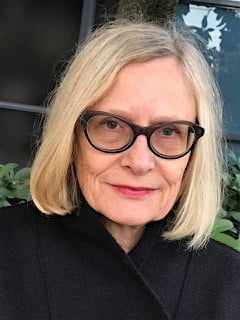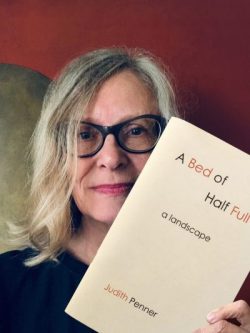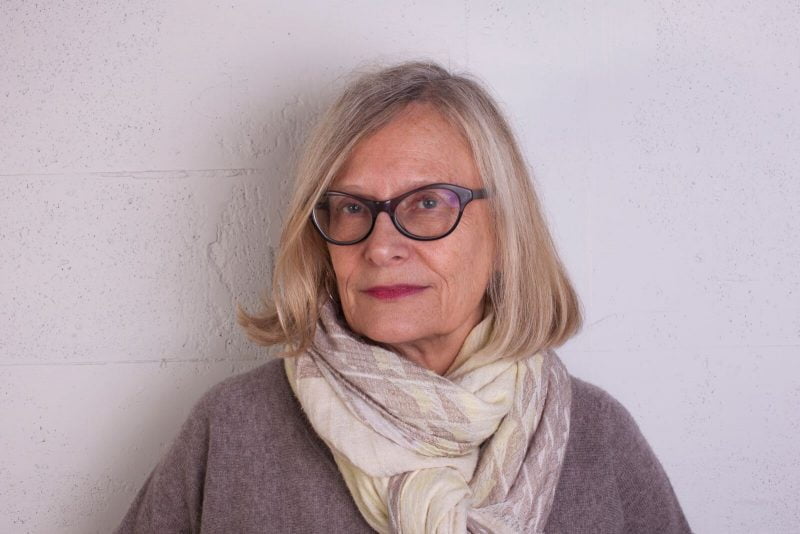#731 Chestnuts and wild city animals
A Bed of Half Full: A Landscape
by Judith Penner
Vancouver: Nomados Press, 2018
$10.00 / 9781927751084
Reviewed by Paul Falardeau
*
 A casual search for the definition of a landscape brings this up from the databanks of the internet: “all the visible features of an area … often considered in terms of their aesthetic appeal.” Traditionally, we might think of dreamily lit impressions on canvas, an idyllic countryside, or majestic natural vistas. In her chapbook from Nomados, A Bed of Half Full: A Landscape, Judith Penner turns this concept into verse and reconsiders the artform with an avante garde sensibility.
A casual search for the definition of a landscape brings this up from the databanks of the internet: “all the visible features of an area … often considered in terms of their aesthetic appeal.” Traditionally, we might think of dreamily lit impressions on canvas, an idyllic countryside, or majestic natural vistas. In her chapbook from Nomados, A Bed of Half Full: A Landscape, Judith Penner turns this concept into verse and reconsiders the artform with an avante garde sensibility.
Penner applies the concept of landscape to poetry by filling her chapbook with short prose poems, never more than a paragraph in length and, sometimes, as little as an isolated title line. These seemingly unconnected poems are often observational, recollections of scenes taken from around an unnamed (but familiar) city. The small moments, thoughts, and struggles she records here are the individual brushstrokes of the larger painting that is the book. Yet she seems to understand that a landscape is not an accurate representation of the ecology it depicts. It is instead the rosy-eyed version of it, the “visible features” through which we attempt to make a picture of the whole. That is how these poems work. Very little is given away in terms of meaning or even metaphor. Instead, each poem is a fragment of a vision, a thought, or maybe an event. All of which seem to hint at, but lack, an overt sense of cohesion to each other. The reader is left with the task of filling in the blanks; of producing meaning.

There are some clues. A pair of characters called “The Emperor” and “The Empress” recur throughout the book, providing loose threads to a fragmented, opaque narrative. These epithets suggest wealth and power. Talk of penthouses and porches seems to confirm this suspicion. Though there is little to set the time or place, it seems as though the pair have recently separated. The Emperor is struggling to regain what is lost, while the Empress is struggling to keep it lost, both afraid of her new surroundings and savouring her freedom. On the back cover, a quote from Fred Wah suggests that these poems “playfully remind us of the tension between our restlessness and our desire for cohesion.” This suggests that the Emperor and Empress may be two sides of the same character, ourselves, who in turn may be “Half empty, half full, or overflowing; your choice.” The landscape of this book, then, may be considered an aesthetic reflection of our own inner ecology; the painting of our own psyche as it is revealed in the ways we choose to assign meaning and coherence to these seemingly random, improvisational poems.
 Due to the nebulous nature of this type of composition and its necessarily reflective, enigmatic nature, A Bed of Half Full is initially an intimidating experience. However, Penner’s verse is the opposite. Immediately familiar, it is easy to consume the 36 pages in one sitting. Her style is relatable and easy, making it digestible and often fun to read. For example, early on, in “Night Adventures of Her Majesty Liberated,” she writes:
Due to the nebulous nature of this type of composition and its necessarily reflective, enigmatic nature, A Bed of Half Full is initially an intimidating experience. However, Penner’s verse is the opposite. Immediately familiar, it is easy to consume the 36 pages in one sitting. Her style is relatable and easy, making it digestible and often fun to read. For example, early on, in “Night Adventures of Her Majesty Liberated,” she writes:
When the light fades she parks where it seems safe,
soothed by a canopy of chestnut trees until a conker
hits the windshield. Re-Parks, now a little more
exposed. Wants to hang her feet out the window just
to straighten her legs but is afraid of coyotes,
raccoons, rats, even neighbourhood cats. Tucked in, an
ancient in a funerary box, she dreams of the
lakeshore, water that slaps her toes.
This poem is typical of the collection. Specifics seem to hint at something cohesive, attainable, but as the poem comes to an end, it fades into a woozy, dreamy tone, centred on the absence of its promised meaning, which poet George Stanley refers to as “the a-logicality of a dream.” Though individual poems do not explain themselves, they are enjoyable to read, as the one above, where the images of chestnuts raining down on windshields and of the newly-independent Empress afraid of wild city animals nipping at her toes make for a tangibility of the now; the Dionysian avoidance of deeper reading. This is not to say that Penner’s verse is frivolous. For example, “Orphan” is a quick but powerful piece where she writes of the titular child, who “Longs for the nights of weekly balls where men dressed as women and women as men and they, without pronoun, was allowed to observe from behind a pillar.” The reader, seeing through the Orphan’s eyes, feels the unlimited potential there. This style means the reader has time to make wider connections between poems or to settle on each vision as complete in itself.
Ultimately, A Bed of Half Full is a landscape that requires repeated visits. Like a place in the living world or a painting of that place, it is not something that can be understood easily, but it can produce a plethora of pleasures and inspire reflection and thought. It is the immediate reward of the well-written poems and their tantalizing suggestion of something more beyond the page that will keep this book on readers’ minds long after they put it down. Penner asks us to consider the question of writing; of art itself. How much of what we read in any book is in ink on the page?

*

Paul Falardeau is a poet, essayist, brewer and most recently, an English teacher, living in Vancouver, a city on the unceded lands of the Musqueam, Squamish and Tsleil-Waututh First Nations, whom he offers respect and gratitude. He is a graduate of University of the Fraser Valley and Simon Fraser University. He has published in Pacific Rim Review of Books, subTerrain, and Cascadia Review, and he contributed an essay to Making Waves: Reading B.C. and Pacific Northwest Literature (Anvil Press, 2010).
*
The Ormsby Review. More Books. More Reviews. More Often.
Publisher and Editor: Richard Mackie
The Ormsby Review is a journal service for serious coverage of B.C. books and authors, hosted by Simon Fraser University. The Advisory Board consists of Jean Barman, Robin Fisher, Cole Harris, Wade Davis, Hugh Johnston, Patricia Roy, David Stouck, and Graeme Wynn. Scholarly Patron: SFU Graduate Liberal Studies. Honorary Patron: Yosef Wosk. Provincial Government Patron since September 2018: Creative BC
“Only connect.” – E.M. Forster
Comments are closed.